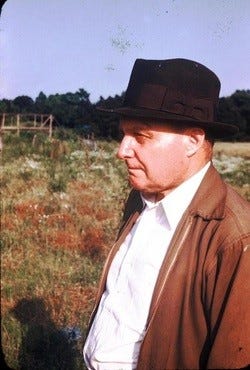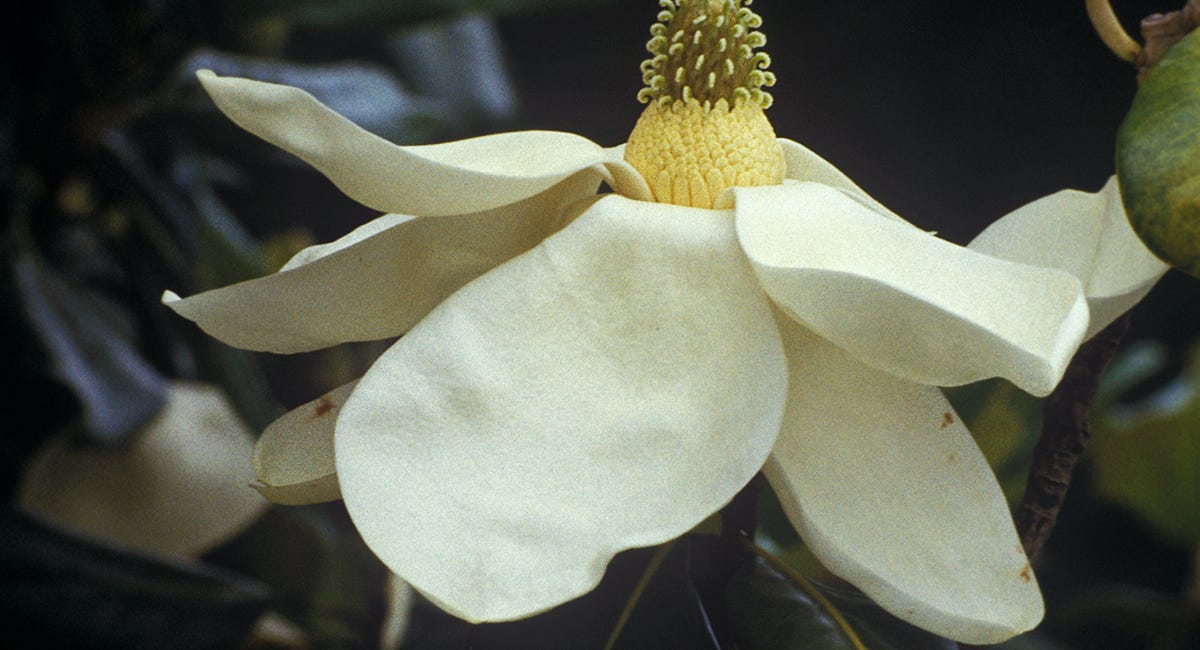Photo courtesy of the Chattanooga Audubon Society
For the last few weeks, I have presented a deluge of my poetry here, so I
Robert Sparks Walker is Tennessee's best-known conservationist. Each year, the Tennessee Department of Environment and Conservation gives a lifetime achievement award known as the Robert Sparks Walker Award.
Walker founded the Chattanooga Audubon Society (CAS) in 1944. The Board of Directors prevailed on him to allow naming the fledgling organization the Robert Sparks Walker Audubon Society. They believed his name recognition would facilitate fundraising and community support. He agreed with the stipulation that it be renamed the Chattanooga Audubon Society after three years.
Walker founded the organization to make his father's farm a wildlife sanctuary. The property was valued at $18,000 (equal to $311,103 itoday), but his siblings agreed to sell their interest for $6,000 ($103,679 today). When he could not raise the total amount, E.Y Chapin Sr., President of the American Bank and Trust Company, purchased and donated the property to the new organization.
Walker designated the property the Elise Chapin Wildlife Sanctuary, honoring Chapin's wife, an active gardener and nature lover. It is popularly known as Audubon Acres. Chattanooga Audubon's acquisition of Maclellan Island in the Tennessee River during Walker's lifetime is sometimes added as a brief footnote to his achievements.
Walker's literary career began years before the founding of Chattanooga Audubon but is rarely mentioned. I hope to preserve a record of Walker's achievements as a poet, editor, publisher, and author and to provoke new interest in his published works.
I began reading Walker's published works while serving on the board of directors and later as President of the Chattanooga Audubon Society. Their library proved valuable as I prepared to perform a living history reenactment.
I eventually performed the reenactment of Robert Sparks Walker at Chattanooga Audubon's 75th-anniversary celebration. I quoted poems from Walker's first two published books, both collections of poems. Some attendees said they did not know that he was a poet. Walker's granddaughter, Alexandra Walker Clark, commented that she had not heard his poetry in years.
I later wrote the article "Pulitzer Prize Nominee has won All the Hearts of Chattanooga" for the online newspaper, the Chattanooga Pulse. I appreciate the response Alexandra Walker Clark gave in the online edition, thanking me for preserving her grandfather’s memory. I thank Editor Gary Poole for the opportunity to contribute to the Chattanooga Pulse.
While serving as President of Chattanooga Audubon, I also arranged for the republication of one of Walker's books, As the Indians Left It. Wonder Press of Chattanooga did the printing, and copies are still sold at the Audubon Acres gift shop. Thanks to the staff, volunteers, and board of directors at Audubon Acres for assisting with that project.
Brief Biographical Sketch
Robert Sparks Walker grew up on a farm just off Sanctuary Road. He referred to the land as "my father's farm,' and used that phrase as the title of his second book.
He and Elberta Clark were married in 1904. Their children were Robert Sparks Walker, Jr. and Wendell Walker. Robert Jr. was killed in an Automobile accident in 1915.
In his book As the Indians Left It, Walker revealed he had planned to move his family to New York so that he would be closer to the publishing world. He had sold his magazine, Southern Fruit Grower, to another publisher in preparation for that move. After his wife Elberta's death made him the sole parent of their remaining son, Wendell, he remained a Tennessee resident.
In her biography, Chattanooga's Robert Sparks Walker: The Unconventional Life of an East Tennessee Naturalist, his granddaughter, Alexandra Walker Clark, gave many insights into Walker's life.
According to Flower and Feather magazine, he suffered a heart attack while leading a nature walk on the Audubon Acres property in 1960. He was taken to his home, where he received medical care and died the following day at age 82.
Robert Sparks Walker (1878-1960) is buried at Audubon Acres, near the cabin that was his childhood home. He lies beside his wife, Sarah Elberta Clark (1882 -1924), and son Robert Sparks Walker, Jr (1907 – 1915).
Significance as a Writer
or Walker's Works in a Nutshell
Walker had a growing reputation as an author and editor when, at age 53, he published Torchlights to the Cherokees (Macmillan, 1931). He spent several weeks examining relevant materials in the files of the American Board of Commissioners for Foreign Missions (Andover-Harvard Theological Library) to complete the book. The Pulitzer Prize nomination for that volume accelerated his career.
He had already published Anchor Poems in 1925, followed by the second book of verse, My Father's Farm, in 1927. He published a promotional booklet for the city of Chattanooga in 1930 and continued publishing newspaper and magazine articles.
Walker followed Torchlights to the Cherokees with a novel, a collection of short stories, two additional books of poetry, and a series of booklets promoting the City of Chattanooga and economic growth in the city and the surrounding area. He returned to book-length nonfiction with Lookout: The Story of a Mountain, which begins with the mountain's geology and continues through human habitation.
His final book-length work, As the Indians Left It, includes stories of childhood life on the farm and documents the early days of the Chattanooga Audubon Society and the sanctuary. He commented about his other works in this volume.
The Chattanooga Public Library has two scrapbooks of articles on the Brainerd Mission. Mary Bell Fisher mentions having examined "The Walker Scrapbooks" in her Thesis for the Master of Arts Degree at Peabody College of Education.
Walker also hosted a weekly radio show and made television appearances. He produced "illustrated slide talks" loaned to schools and civic groups. These talks consisted of a set of 35 mm slides and an accompanying script. Walker presented these talks. He was noted for public speaking, but they were also designed so that a member of an organization could read the script and advance the slides.
For more about Chattanooga based nature writers, see Writing Chattanooga: Southern by Nature
This article also includes more about southern nature writing.
Writing Chattanooga: Southern by Nature
Roots of Southern Nature Writing
New to this publication? Check out my directory, “The Journey So Far.” In an earlier edition, I cited four authors as early literary naturalists connected to Chattanooga, Tennessee. I am sure there are other Southern nature writers from the eras of Walker, Miles, Steele, and Torrey, and I would love to hear about them, for nature writing is as much abou…





Torchlights shoulda gotten the Pulitzer. Forget what it lost out to ... Lindberg’s autobiography? And I work with one of RSW’s family! They’re also related to Mary Robinette Kowal, who writes the Lady Astronaut series!
Coming next time - The Poetry of Robert Sparks Walker. He published four books of poems in his lifetime.